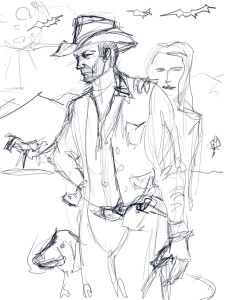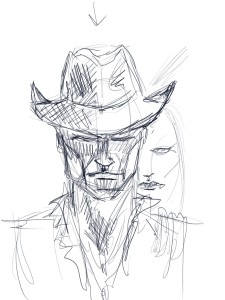Home > Soapbox > It’s complicated (when your writing partner is also your romantic partner)
It’s complicated (when your writing partner is also your romantic partner)
Ever heard a writer say, “I’m my own worst critic.” Clearly, they don’t write with a romantic partner.
We’ve been writing together for almost two decades now, dating back to a fateful meeting in a Madras, Oregon, truckstop after our fiery relationship exploded and collapsed in on itself. After a two-year forced separation to let the jagged edges of our hearts heal, we met in neutral territory and decided to give it another go, only this time with some ground rules: a shared focus on creative writing. It was the only strategy we could come up with that gave us a fighting chance to harness and refocus some of the destructive energy that burned us down.
 And so, The Cowboy and the Vampire Collection was born — sketched out on the back of a placemat in crayon and featuring romantic protagonists who mirrored our own opposites-attract and gloriously dysfunctional relationship.
And so, The Cowboy and the Vampire Collection was born — sketched out on the back of a placemat in crayon and featuring romantic protagonists who mirrored our own opposites-attract and gloriously dysfunctional relationship.
Book four, The Last Sunset, brings the series to close and as we prepare to embark on an exciting new mystery series (also featuring a dysfunctional couple, only this time without the paranormal elements), we wanted to share a few things we’ve learned about writing with your partner.
It’s efficient. Couples share a secret language hard won from years of trial and error experience that can make communication seem almost effortless. When you can finish each other’s spoken sentences, finishing each other’s written sentences is second nature. The downside, of course is that the secret language usually contains short cuts to hurtful things, things that tend to surface during otherwise normal discussions about plots, over-reliance on em dashes or the value of flashbacks.
It’s authentic. Writing about romance is always risky unless it’s grounded in enough reality to avoid cliché. It’s pretty easy to avoid cliché when you are writing about love with the person you love. If a scene makes your partner roll her eyes, it’s probably worth reconsidering the execution. The same goes for sex scenes. We’re don’t write erotica, so our work isn’t graphic, but our characters know their way around the bedroom, and that comes from years of research. Hmm, maybe we SHOULD write erotica.
It’s effective. Writing with a partner is like having a focus group and constant editor following you around and judging your work AT ALL TIMES. It never ends, never stops, twenty four/seven. A culture of continual improvement, as they say in corporate America. Even the smallest bit of writing — a Facebook post or a tweet — is enough to evoke a passing, and usually accurate, critique. Once you get past the bruised ego and occasional tears, it’s truly liberating to know someone always has your creative best interests at heart.
 It’s self-sustaining. If a little competition is healthy, writing together is a lifetime’s supply of mega vitamins, and energy drinks. Writing together is a great way to maintain momentum. No matter how tired or depressed or apathetic (possibly the natural state of the writer) one of you is, watching your partner make progress on your book is usually enough lift the other out of the doldrums and get you refocused.
It’s self-sustaining. If a little competition is healthy, writing together is a lifetime’s supply of mega vitamins, and energy drinks. Writing together is a great way to maintain momentum. No matter how tired or depressed or apathetic (possibly the natural state of the writer) one of you is, watching your partner make progress on your book is usually enough lift the other out of the doldrums and get you refocused.
It’s cheaper than therapy. And a lot cheaper than a marriage counselor. We set out on this shared creative path as a way to embrace the creative life and to get even closer romantically. It’s worked on both fronts.
Writing together is an incredible experience — sustaining, challenging, energizing — except for the fights. And the hard work. And the tired eyes. And the thousands of tiny, unhealed emotional wounds.
Still, totally worth it!
